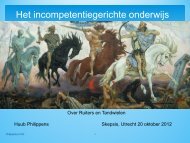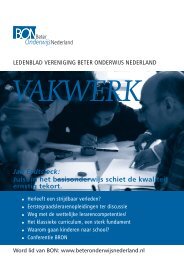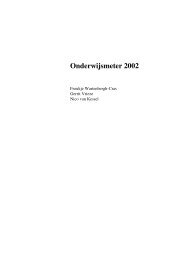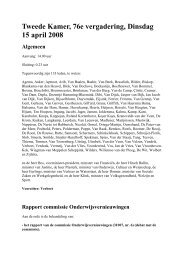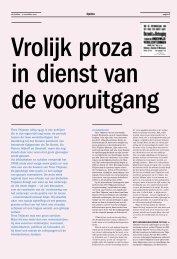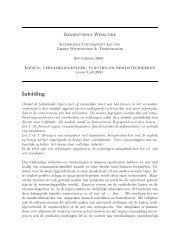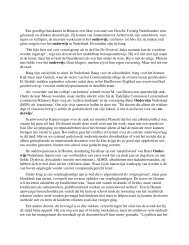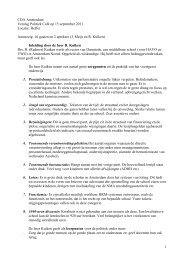Leraar worden:'under construction'? - Open Universiteit Nederland
Leraar worden:'under construction'? - Open Universiteit Nederland
Leraar worden:'under construction'? - Open Universiteit Nederland
Create successful ePaper yourself
Turn your PDF publications into a flip-book with our unique Google optimized e-Paper software.
Wardekker (ongepubliceerd) onderscheidt vier vormen van constructivisme. Ik citeer hem uitgebreid<br />
om een aantal nuances te laten zien.‘(...) it is recognised in several places that there are different interpretations<br />
of the concept of ‘’constructivism’’, but the general tendency here is to speak of constructivism<br />
as a whole. In a sense, this is right: there is a common ground to all forms of constructivism,<br />
which is that the learning individual actively constructs for itself an image of the world, instead of<br />
adopting it passively. This is why we speak of ‘’acquisition’’ rather than ‘’transmission’’ models.<br />
Nowadays, only a minority of psychologists and educationalists do not accept this Piaget-based thesis.<br />
The clear consequence for education is that pupils should be allowed to work independently on<br />
constructing their own image of the world – a way of thinking related to child-centered education<br />
theory. However, this raises questions about what will guarantee the quality of the construction they<br />
arrive at. On this point, and on the question how the construction process actually works, both the<br />
general principle and the educational consequences can be interpreted in totally different ways...’<br />
Wardekker vervolgt:‘On one side of the spectrum, there are the ‘’cognitivist constructionists’’, also<br />
sometimes called ‘’trivial constructivism’’. They are the most direct followers of Piaget. In their view, we<br />
should differentiate between accidental and systematic differences in the individual constructions of<br />
reality. The systematic differences occur because children in different stages of their cognitive development<br />
think in different stage-related ways. Education has to take this into account by allowing for<br />
the stage children are in, and not trying to teach them things they cannot yet understand. The differences<br />
can be interpreted as specific logical errors, which are systematically corrected as development<br />
progresses. First the child thinks according to its own subjective logic, later according to rules<br />
suggested by others, and finally according to the formal logic rules that govern the world as it is.<br />
Because of the innate structure of the brain, both the progression of stages and the end point of<br />
development are in principle the same for every person, ultimately (and, as Piaget admits, in many<br />
cases only tendentially) leading to a world view which is free of logical-mathematical errors – a process<br />
called decentring. (The development of the brain thus is pre-programmed in terms of its stages<br />
and direction, but it does require input from the outside world to take place at all.) It may still contain<br />
factual errors, but these are accidental. This is where education can help: by providing opportunities<br />
for experience with the world, it stimulates children to come to the right interpretation of the world<br />
sooner and more completely. The newest version of cognitivist constructionism combines these ideas<br />
with the stimulation of metacognition. Now, it is not so much building a correct worldview which is<br />
the educational task, as it necessarily rests on changeable and questionable knowledge. It is therefore<br />
more the capacity and skill of (re)building a cognitive map (schema) which has to be learned. This<br />
consists of a combination of cognitive (reading, interpreting etc.) and metacognitive (monitoring your<br />
own work) skills. The Dutch psychologist Boekaerts for instance, one of the driving forces of a recent<br />
innovation in upper secondary education in which this ‘’self-regulation’’ skill is central, suggests that<br />
monitoring your motivation to carry out an assigned learning task is one of the most important learning<br />
skills. In this way, motivation becomes something that you can ‘’switch yourself on’’: your task is<br />
to motivate yourself to keep working on the task as formulated by the curriculum. The effect of such<br />
an interpretation is that pupils are made responsible for their own efforts, without having any influence<br />
on the tasks they are assigned. Also, it now becomes possible (contrary to child-centred education)<br />
to set the pace and the specific objectives of education centrally, as in traditional education. A clear<br />
difference with traditional forms is that the teacher is more of an attendant and guide for pupils. At<br />
the other extreme of the spectrum we find ‘’radical constructivism’’ as defended by Von Glasersfeld.<br />
According to him, nothing can guarantee that eventually everyone will arrive at the same mental<br />
schema or construct of reality. We cannot know reality objectively, and everybody at least perceives it<br />
differently. Our schemas are our very own, and the best we can do is to coordinate them by talking to<br />
each other so they may become more alike. This possibility is enhanced by the information schools<br />
impart - the school as an institution of socialisation - but even then a strictly individual kernel<br />
remains, for these constructions are not just cognitive, but also affective and emotional ones.<br />
<strong>Leraar</strong> <strong>worden</strong>: ‘under construction’?<br />
85





